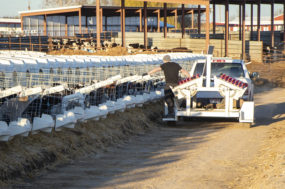A special feature of the Northeast Dairy Management Conference is a focus on leadership development and personal growth. Mark Mayfield kicked off the conference acknowledging and bringing humor to stress management with his presentation “Momma Told Me There’d Be Days Like This”. Mayfield, a past FFA national president, has taught agriculture, lobbied on behalf of agriculture, and is a professional speaker. The challenges of COVID, new and existing regulations, staffing shortages, milk price, and weather, have all tested the resilience of farmers across the country. “Mental health, depression, suicide, anxiety, and everything associated with agriculture right now exceeds the 1980s farm crises,” Mayfield said.
Change is more difficult in agriculture because we are traditional and sentimental. Age is a hindrance, as the older you get the more reluctant you are to change, but Mayfield said we must continue to morph. “We have to constantly change our technology, our communication strategy, our coalitions, and our mindset,” he said. “You can ignore change and hope it goes away, react to it and play catch up, or create change and win.” Activism is more important than ever for your industry, your association, and your community. Remember cycles, history, and agriculture’s perpetual optimism. Practice REACH: Relaxation – illness or injury is often caused or worsened by stress, Exercise – it must be regular and elevate the heart rate, Avocation – find a hobby that brings pleasure, Communication – identify two people who you can talk to and avoid internalizing problems, and Humor - laugh and find ways to have fun daily. This will enhance your creativity and state of mind, which is now more important than ever.
 The biennial Northeast Dairy Management Conference offers a range of topics from technical skills to professional development. Photo by Julie Berry
The biennial Northeast Dairy Management Conference offers a range of topics from technical skills to professional development. Photo by Julie Berry
Practice the pause to gain perspective when an emergency arises. Ask “Will it make the six-o’clock news?” as a litmus test to whether this is a truly stressful issue or just an inconvenience. “One of the biggest issues we have in life is that we don’t put stuff in the right pile,” Mayfield said. “We put it in a stress pile and it’s not a stress pile. It should be in the inconvenience pile.” Do a minute of deep breathing every hour. Perform a random act of kindness to bring new perspective to your own challenges. Talk to people. “In agriculture we are trained that we deal with stuff ourselves,” Mayfield said. “We keep it inside. Those days are over. Communicate. This is why we have friends and family. This is even why we talk to ourselves. We’ve got some real stuff to deal with.” Know your priorities and evaluate how this problem lines up. Recall a day or event that clearly identifies what’s most important to you to reset your baseline for happiness and success. Visit his website at Mark Mayfield.
Holly Green, The Human Factor, offered insight and strategies in “Adapting and Thriving in an Ever-Changing World”. The human brain is not wired to work efficiently at our current hyper-pace, but understanding our limitations and applying strategies allows us to adapt more effectively. Each time we are met with unexpected change we go through a cycle of shock, denial, frustration or anger, depression and lack of energy, before acceptance. “You could go through these phases in a second, it could be minutes, or it could take a month. Sometimes people get stuck,” Green said. “Once we begin to really process the unexpected change and say okay, it is what it is, I have to make the best of it, is when we begin to accept.”
Change is usually out of our control but how we respond is more in our control than we realize. “The magic trick to all of this is resiliency,” Green said. “Resilient people discern the difference between external change, and internal ‘How the heck do I deal with this?,’ and can continue to get the right things done. They continue to have a great attitude, even when the world is falling apart around them.”
Resilient people are:
- POSITIVE, with inner confidence and self-assurance, and choose to focus on opportunities over obstacles. “A global trigger for the human brain is how can I help others?,” Green said. “If you can’t even get yourself back to a great positive view on things just ask yourself, how can I help others do that, and by doing that you’re helping yourself.”
- FOCUSED and maintain a clear vision of their goals, and feed their brain facts and credible information. Ask what’s important to me in my life and speak and think about it as if it’s already achieved. “This helps us keep focused,” Green said. “This is your best time management tool. What is going to move me, my team, our organization, closer to winning?”
- FLEXIBLE when responding to change or uncertainty. “Get a little uncomfortable, practice doing that,” Green said. “That’s what creates flexibility in your brain.”
- PROACTIVE and adapt to change, even though our brain prefers the comfort of the familiar. “Take the time to actually plan,” Green said. “Do not presume it will occur otherwise. Establish some mental reserves. Learn some new skills, something you’ve always wanted to try.”
- ORGANIZED with routines and clear processes to sort information. Spend time eliminating clutter. “Have a clear workspace and simple little things like organizing files. Get organized. That brings us a sense of comfort whether we are good at it or not.”
To set yourself up for success, start each day by identifying and writing down your intentions. Taking notes triggers secondary learning modality, which increases the “stickiness” of what you’re trying to remember. Make your goals visual. Get outside. “Practice kindness. Be kind to yourself, your self-talk,” Green said. “Treat yourself like you would a respected, loved, and valued friend.” Engage others. At our core we are all social. “Be positive, focused, proactive, organized, prompt yourself, do not presume you are any better than the rest of us,” Green said. “Set yourself up and make sure you’ve got things that you’re holding onto that do stay the same.” Learn more about Holly Green at the Human Factor.
 |
This article appeared in PRO-DAIRY's The Manager in July 2022. To learn more about Cornell CALS PRO-DAIRY, visit PRO-DAIRY. |







